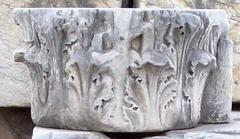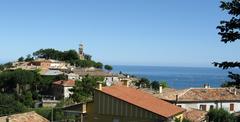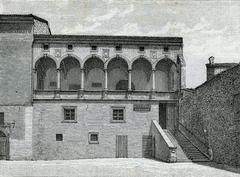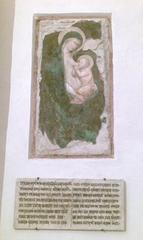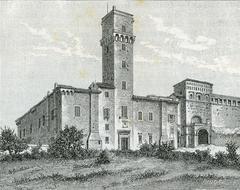
Pesaro Cathedral: Visiting Hours, Tickets, and Historical Sites in Pesaro, Italy
Date: 04/07/2025
Introduction
Nestled in the heart of Pesaro, Italy, the Cathedral of Santa Maria Assunta—commonly called Pesaro Cathedral—stands as a living testament to centuries of religious devotion, architectural transformation, and civic identity. Serving as the archiepiscopal seat of the Archdiocese of Pesaro, the cathedral not only anchors the city’s spiritual life but also showcases layers of historical and artistic heritage. This guide offers an in-depth look at the cathedral’s history, spiritual significance, architectural highlights, visitor information including hours and tickets, accessibility, and nearby attractions, ensuring a rich and meaningful experience for every traveler (Domus Pesaro; Wikipedia; Audiala).
Table of Contents
- Introduction
- Historical Overview
- Spiritual and Religious Importance
- Architectural Features
- Practical Visitor Information
- Travel Tips & Nearby Attractions
- Frequently Asked Questions (FAQ)
- Conclusion & Call to Action
- References
Historical Overview
Early Christian Origins
Pesaro Cathedral’s foundation traces back to the earliest centuries of Christianity in Italy. Archaeological excavations have revealed two layers of mosaic pavements from the 4th and 6th centuries, evidence that the site originally hosted early Christian worship spaces atop a former pagan temple (Domus Pesaro). The original church is traditionally attributed to Bishop Fiorenzo (3rd century), with later reconstructions following the destruction wrought by the Gothic Wars.
Medieval and Renaissance Developments
Initially, the episcopal seat was located outside the city, but threats from invasions prompted its move within Pesaro’s walls to the Church of San Terenzio. The cathedral became home to the relics of Saint Terence (San Terenzio), the city’s patron, solidifying its importance as a pilgrimage site. The Romanesque brick façade, constructed between 1282 and 1312, and the involvement of powerful families like the Malatesta and Sforza, brought further artistic and spiritual prestige (Wikipedia).
Baroque and Neoclassical Transformations
In 1663, the cathedral underwent a dramatic Baroque renovation, aligning with the Counter-Reformation’s emphasis on grandeur. The Napoleonic era brought significant losses, including the removal of several artworks. The late 19th and early 20th centuries saw a neoclassical redesign of the interior, led by Giovanni Battista Carducci and Luigi Galli, resulting in the Latin cross plan and the addition of chapels such as San Terenzio and the Blessed Sacrament (Domus Pesaro).
Artistic Heritage
The cathedral houses significant works, including Marco Benefial’s “Assumption of Mary,” Antonio Cimatori’s “Saint Jerome in Meditation,” and a 1510 Annunciation by Luca Frosino. The revered 14th-century fresco “Madonna del Popolo” and contemporary icons by Francesca Pari offer further artistic depth.
Spiritual and Religious Importance
Pesaro Cathedral serves as the archdiocese’s liturgical heart, hosting ordinations, confirmations, and major religious festivals. The Cappella di San Terenzio houses the relics of Saint Terence, making the cathedral a pilgrimage destination, especially during his feast day on September 24. The incorrupt body of Blessed Serafina Sforza, interred here, continues to inspire devotion (Catholicshrinebasilica; Triplyzer). The cathedral’s ongoing role as a parish church ensures its integration into daily religious and community life (Christianedirectory).
Architectural Features
Façade and Exterior
Standing near Piazza del Popolo, the cathedral’s exterior blends Romanesque and Gothic elements. The brick façade, completed in the late 13th century, features a rose window and ogival arches, while the Gothic portal is adorned with sculpted capitals and delicate stonework (Italy This Way). Though austere by Italian standards, the façade harmonizes with the surrounding medieval cityscape.
Interior and Mosaics
Inside, the cathedral boasts a three-aisle layout with robust columns and a luminous nave. The showpiece is the mosaic floor, visible through glass panels, dating to the 6th century and depicting mythological and symbolic creatures such as “lamiae,” doves, greyhounds, and griffins. These mosaics are a unique testament to early Christian iconography (Italy This Way).
Additional highlights include Renaissance and Baroque altarpieces, the crypt housing Saint Terence’s relics, and the neoclassical chapels. The cathedral’s artistic and architectural synthesis reflects centuries of patronage and evolving styles (Arcidiocesipesaro).
Practical Visitor Information
Visiting Hours & Tickets
- Monday – Saturday: 9:00 AM – 12:30 PM, 3:30 PM – 6:00 PM
- Sundays & Holidays: 10:00 AM – 12:30 PM, 3:30 PM – 6:00 PM
Note: Hours may change during religious services or special events; always check the official diocese website or local tourist information before visiting.
- Admission: Free; donations encouraged for maintenance.
- Guided Tours: Available by arrangement, sometimes with a modest fee (Official Diocese Website).
Accessibility
- Wheelchair accessible entrances and ramps are available.
- For special assistance, contact the cathedral’s administrative office in advance.
Guided Tours & Photography
- Guided Tours: Offer in-depth insights into history, art, and architecture.
- Audio Guides: Available in several languages.
- Photography: Allowed without flash or tripods; be respectful during services.
Travel Tips & Nearby Attractions
- Getting There: The cathedral is centrally located on Via Rossini, within easy walking distance of major attractions (try-travel.com).
- Dress Code: Modest attire is required; cover shoulders and knees.
- Best Times: Early morning or late afternoon for a quieter visit.
- Local Facilities: Cafés, restaurants, and shops nearby; public restrooms in adjacent buildings.
Nearby Attractions:
- Palazzo Ducale: Renaissance palace with art collections.
- Museo Diocesano: Religious art and manuscripts.
- Rossini Museum: Dedicated to the composer born in Pesaro.
- Big Sphere A. Pomodoro: Iconic bronze sculpture.
- Baia Flaminia: Beach within easy reach.
Frequently Asked Questions (FAQ)
Q: What are the Pesaro Cathedral visiting hours?
A: Typically Monday to Saturday 9:00 AM–12:30 PM & 3:30 PM–6:00 PM; Sundays and holidays 10:00 AM–12:30 PM & 3:30 PM–6:00 PM. Always confirm ahead.
Q: Is there an entry fee or ticket required?
A: General entry is free; donations are welcome. Guided tours may require a booking and small fee.
Q: Is the cathedral wheelchair accessible?
A: Yes, with ramps and assistance upon request.
Q: Are guided tours available?
A: Yes, arrange via the cathedral office or local tourist centers.
Q: Are there special events or festivals?
A: Major events include the Feast of the Assumption (August 15) and Saint Terence’s Day (September 24), with special services and processions.
Q: Can I take photographs?
A: Yes, but avoid flash and tripods; be discreet during services.
Conclusion & Call to Action
Pesaro Cathedral is not only a remarkable architectural and spiritual landmark but also a centerpiece of the city’s identity and cultural life. Its layered history—from early Christian mosaics to Renaissance patronage and Baroque transformation—makes it a compelling destination for pilgrims, art lovers, and travelers alike.
Plan your visit by checking the latest hours and events. Download the Audiala app for audio guides, interactive maps, and updates on cathedral activities. For more travel tips and Italian heritage insights, explore related posts and follow us on social media.
Enjoy your journey to Pesaro Cathedral—where history, art, and faith converge in one of Marche’s most treasured sites.
References
- Pesaro Cathedral: Visiting Hours, Tickets, History, and Travel Tips for Pesaro Historical Sites, 2024 (Domus Pesaro)
- Pesaro Cathedral: History, Religious Significance, Visiting Hours, and Visitor Guide, 2024 (Audiala)
- Pesaro Cathedral Wikipedia Article, 2024 (Wikipedia)
- Pesaro Cathedral Official Diocese Website, 2024 (Archdiocese of Pesaro)
- Pesaro Cathedral: Hours, Tickets, and Architectural Highlights of a Pesaro Historical Site, 2024 (Italy This Way)
- Visiting Pesaro Cathedral: Hours, Tickets, and Top Attractions in Pesaro, 2024 (Try Travel)
- Catholic Shrine Basilica, 2024 (Catholicshrinebasilica)
- Bewitched by Italy: Visit Pesaro Marche Best Things to See, 2024 (Bewitchedbyitaly)


